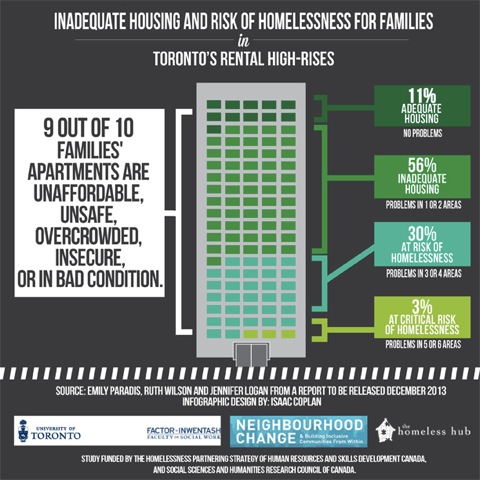Photo by Jesse Colin Jackson
Update: A new edition of this report is available as of March 12, 2014.
It has long been understood that while Toronto’s tower neighbourhoods are areas of social need (see reports “Vertical Poverty,” and “Tower Neighbourhood Renewal in the Greater Golden Horseshoe”), they also provide a vital source of affordable housing in the region. Just how tenuous that affordability can be, however, is the subject of a recent U of T Cities Centre report by Emily Paradis.
According to the report, nine out of ten families in Toronto’s aging suburban high-rise buildings are at risk of homelessness or “hidden homelessness,” a growing trend where families who cannot afford their own home must share with others in sometimes overcrowded situations.
While a range of initiatives are making important progress in improving the livability of tower neighbourhoods (Such as new RAC Zoning), it is clear that significant policy and action aimed at maintaining this vital housing stock and improving and maintaining affordability are critical.
- View the U of T Cities Centre report by Emily Paradis.
- Read Jessica McDiarmid in the Toronto Star: “Nine of 10 families at risk of homelessness in low-income highrises: study”
And see other studies relevant to these issues:
- “Strong Neighbourhoods and Complete Communities: A New Approach to Zoning for Apartment Neighbourhoods,” a United Way and CUG+R report, 2012
- “Toward Healthier Apartment Neighbourhoods,” a Toronto Public Health and CUG+R report, 2012
- “Vertical Poverty,” a United Way report, 2011
- “Tower Neighbourhood Renewal in the Greater Golden Horseshoe,” a CUG+R, Cities Centre, and Ministry of Infrastructure report, 2010

